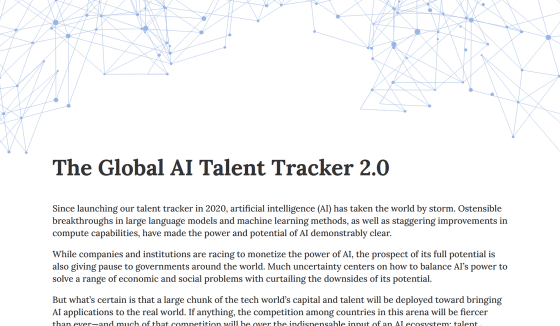It turns out that about 50% of the world's top AI researchers are from China

There is an impression that Western countries, centered on the United States, are leading the world in the development of chatbots and generative AI. However, a survey conducted by
The Global AI Talent Tracker 2.0 - MacroPolo
https://macropolo.org/digital-projects/the-global-ai-talent-tracker/

In One Key AI Metric, China Pulls Ahead of the US: Talent - The New York Times
https://www.nytimes.com/2024/03/22/technology/china-ai-talent.html
In recent years, due to factors such as breakthroughs in large-scale language models and machine learning, and dramatic improvements in computing power, companies and institutions around the world are fiercely competing to acquire AI talent. MacroPolo is a paper accepted by Neural Information Processing Systems (NeurIPS) , an international conference in the field of AI and machine learning, to quantify the global balance of human resources, which are an essential element for the development of AI ecosystems. We conducted a survey using a sample of
NeurIPS is known as a difficult international conference with a low paper acceptance rate, with 1,428 papers accepted in 2019, an acceptance rate of 21.6%, and 2,671 papers accepted in 2022, an acceptance rate of 25.6%. was. Therefore, the authors of papers accepted by NeurIPS are an excellent indicator that they are among the top 20% of top researchers in AI research.
The graph below shows ``Countries of universities where the top 20% of AI researchers graduated from their undergraduate degrees'', with the left side representing 2019 and the right side representing 2022. In 2019, it was 29% in China, 20% in America, 17% in Europe, and 8% in India, but in 2022, it will be 47% in China, 18% in America, 12% in Europe, and 5% in India. This shows that approximately half of the top AI researchers are from China.

Also, below is a graph showing the countries where the top 20% of AI researchers work. In 2019, it was 59% in the United States, 11% in China, 10% in Europe, and 6% in Canada, but in 2022 it will be 42% in the United States, 28% in China, 12% in Europe, and 2% in Canada. I am.

These graphs show that China's domestic pool of AI talent is rapidly expanding, and the demand for its own AI industry is also increasing. The daily New York Times points out that ``China has been able to develop so many AI talents in part because it has invested heavily in AI education.''
Since 2018, China has added AI programs in more than 2,000 faculties, more than 300 of which are at top universities, according to Damian Ma, managing director of MacroPolo. However, many of them pursue AI applications in industry and manufacturing, and do not seem to focus much on the breakthrough of generative AI that dominates the American AI industry.
The AI researchers born in this way are important human resources for American companies. The graph below shows the countries of origin of top AI researchers working at American research institutions. In 2019, it was 31% in the United States, 27% in China, 11% in Europe, 11% in India, and 3% in Canada, but in 2022 it will be 37% in the United States and 38% in China. alone accounts for 75%.

Peter Abeel, a professor at the University of California, Berkeley, and founder of AI and robotics startup Covariant, says it's common to work with many Chinese researchers at major American companies and universities. It states that.
The increase in Chinese AI researchers working in the United States poses a dilemma: ``While we want to prevent Chinese espionage, if we do not accept Chinese AI researchers, we will fall behind in the competition in the AI field.'' I am. In March 2024, a former Google employee from China was indicted on charges of stealing AI-related trade secrets and passing them on to a Chinese company.
A Chinese employee at Google is arrested and charged with stealing AI-related trade secrets and passing them on to a Chinese company - GIGAZINE

◆Forum now open
A forum related to this article has been set up on the GIGAZINE official Discord server . Anyone can write freely, so please feel free to comment! If you do not have a Discord account, please create one by referring to the article explaining how to create an account!
• Discord | 'Do you think Japan can exert influence in AI research?' | GIGAZINE
https://discord.com/channels/1037961069903216680/1221749415530729492
Related Posts:







